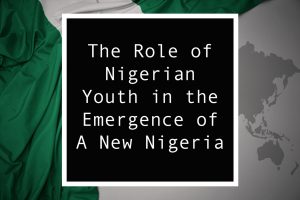It is not lost on Nigerians that the country is in dire straits. According to the official inflation reports for August 2024, Nigeria’s headline inflation rate is 32.15%, and 37.52% for food inflation. However, if you were to take a survey about Nigerians frequenting the markets, they would declare an inflation rate beyond official figures. For the majority, their pockets feel lighter and food baskets weigh less.
Nigeria’s precarious economic straits necessitate unveiling multiple layers of financial mismanagement by previous government administrations. Nonetheless, the people and government must look forward and plan for the future. Therefore, the question on the lips of Nigerian youths concerns their futures: When will the country get better?
The Current Economic Malady
Throughout history, mankind has sought progress, and today, the global poverty rate is in decline. However, Sub-Saharan Africa accounts for a major share of the global poverty rate, with over 400 million people living in extreme poverty. Nigeria, a country with a youthful population of 151 million people, has over 62.37 million people living in extreme poverty in 2024. To clarify, according to official forex rates, they live below $2.15 per day, which stands at ₦3,418.5.
Nigeria has a history of alms begging, from indigent people using children to solicit alms and adults requesting pennies. The economic woes have exacerbated the tolerated social ilk as capable adults resort to asking for money on the streets, in malls, in religious houses, in schools, and on the Internet. Indeed, this malaise is a symptom of the country’s exigent economic woes. Yet it reflects a deeper problem: an absence of productivity. Data from the National Bureau of Statistics shows Nigeria’s unemployment rate at 5% in the third quarter of 2023. The National Labour Congress criticized these figures, stating that they misrepresent a depiction of the country’s unemployment rate.

Studies have depicted a correlation between poverty and crime. However, other variables such as education, income disparity, and unemployment contribute to crime. Nigerian elders bemoan the loss of values and the permeation of social vices among the youth. There is no justification for crime, but a youthful nation plagued by inadequate productivity and high poverty will experience a crime surge. Thus, Nigeria faces a productivity problem, and its effects on the social fabric cannot be ignored.
Protests and Unrests
Over the past month, the Nigerian government discouraged protests due to fears about their violent courses. In October 2020, the ENDSARS protest occurred, which took on a violent turn in Lagos, leading to the loss of lives and property. Despite the best efforts of the government to preclude the recent protests, they were inevitable, and protests took on a violent turn in the northeastern part of the country. These protests occurred due to dissatisfaction with current economic woes. Protesters themed the protest “A Hunger Protest” as they carried placards and empty pots.
The slow walk to redemption
On the 29th of May 2023, the newly sworn-in president, Bola Ahmad Tinubu, announced the immediate removal of the petrol subsidy. This policy, while brave and necessary to reduce Nigeria’s copious debt, exacerbated the cost of living. Although it aims to avert a potential economic crisis, Nigerians have had to bear a heavy burden since it took effect. The Nigerian government’s “shock therapy,” which includes an increase in interest rate is vital to setting Nigeria on the right economic path. Nonetheless, the people’s grouse arises from the efforts taken by the government to extenuate the side effects of these policies.
Currently, Nigerians have little faith in the government. Thus, emigration is a rising trend that garners momentum daily. Japa, which means ‘to flee’ is a prevailing dream amongst young Nigerians. However, brain drain delays the country’s progress. The Nigerian people are its most crucial resource, and losing its resources in droves, particularly in crucial sectors such as healthcare, strains the country’s path to economic advancement.
Nigeria must prioritise people-driven development. It goes beyond wishful thinking that the government must actively seek the evolution of its people. Therefore, messages that spread notions of sending youths to farms are obsolete. Motions should focus on advancing agricultural methods, acclimatizing to climate change, necessitating state and local government participation in agriculture, and combating insecurity.
A niggling concern is the lack of direction facing the informal vocational sector. The blue-collar sector accounts for a significant majority of Nigeria’s employment figures. However, there is a skill gap. This skill gap exists because the nation lacks scalable training programs that impute and develop skills. Therefore, the informal apprentice system dominates the vocational sector. There are multiple complaints from the masses about the lack of competence from these informally trained handymen. Thus, the onus lies on the government to create sustainable institutions to provide a sustainable union with the private sector.
The path to economic redemption is steep, and the people will keep tightening their belts further. However, the government must also tighten its belts and trim its frivolities. Thus, the people and government must ensure themselves and stay on this path to economic reform.
The Country’s Hope
Prior to the previous elections, the Nigerian president chose “Renewed Hope” as his campaign theme. Despite the message his campaign attempted to pass, only a certain percentage of the population stood with him, thus he won with 37% of the electoral votes. This phenomenon raised questions: Would the Nigerian majority accept his economic policies? Would he win a reelection if he ends up becoming an unpopular president?
These questions will receive loud answers over the rest of his tenure but the most crucial facet is where Nigerians will place their hope. As a Nigerian citizen, the country’s hope lies in the hope of the average Nigerian. If we do not believe the government can advance our nation, we must take the bull by the horns and seek the country’s progress. I believe Nigeria is past the need for political messiahs and grandstanders. This notion extends to all Sub-Saharan African states; the people must work and transform their lands. However, the difficulty lies in the how.
As a reader, and a concerned citizen, how do you think Nigerians can take responsibility for the country? By reforming our ideals and values? By discarding existing political ethos? Or by choosing to align ourselves with seeking growth? It is up to us to reclaim the lost years.







